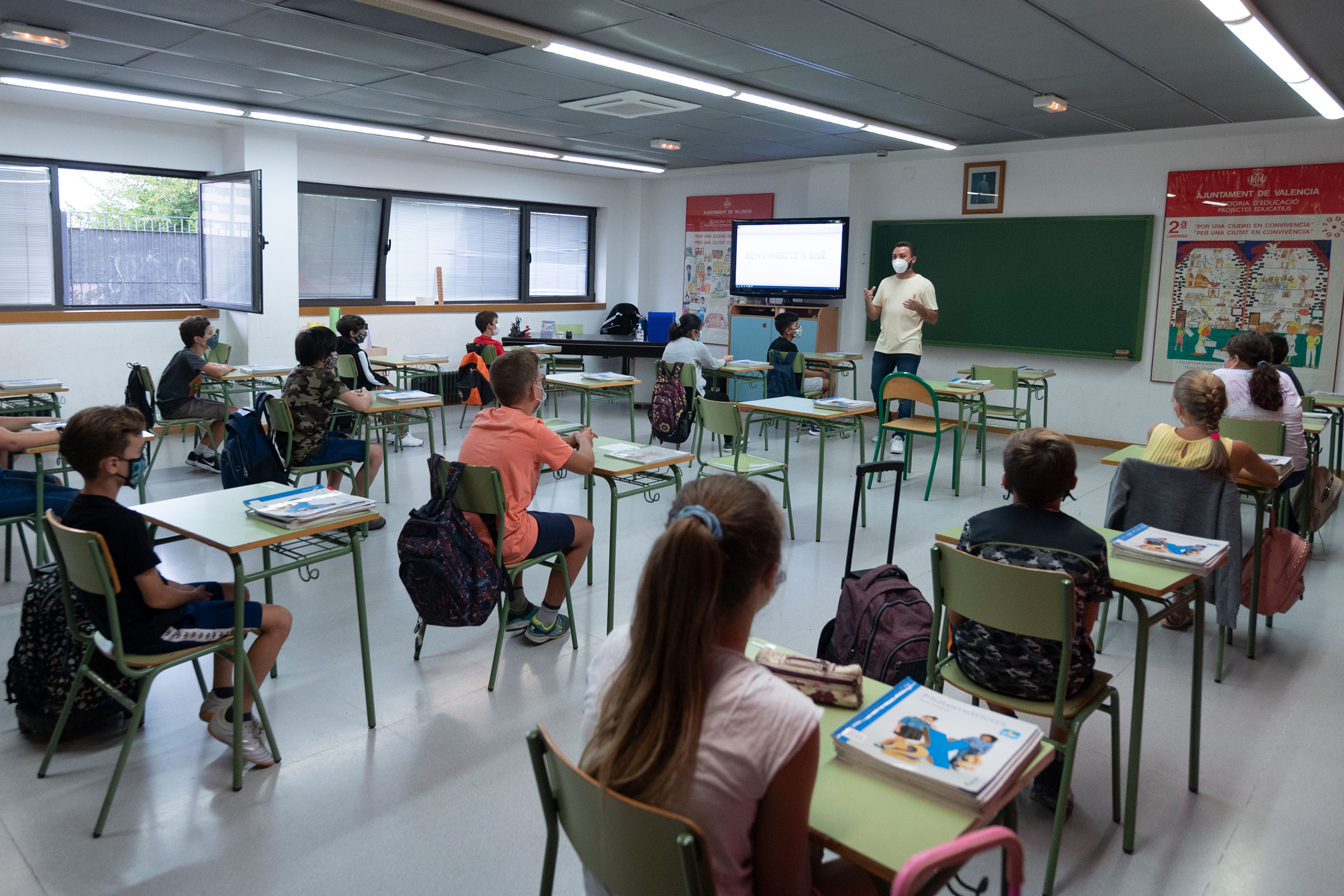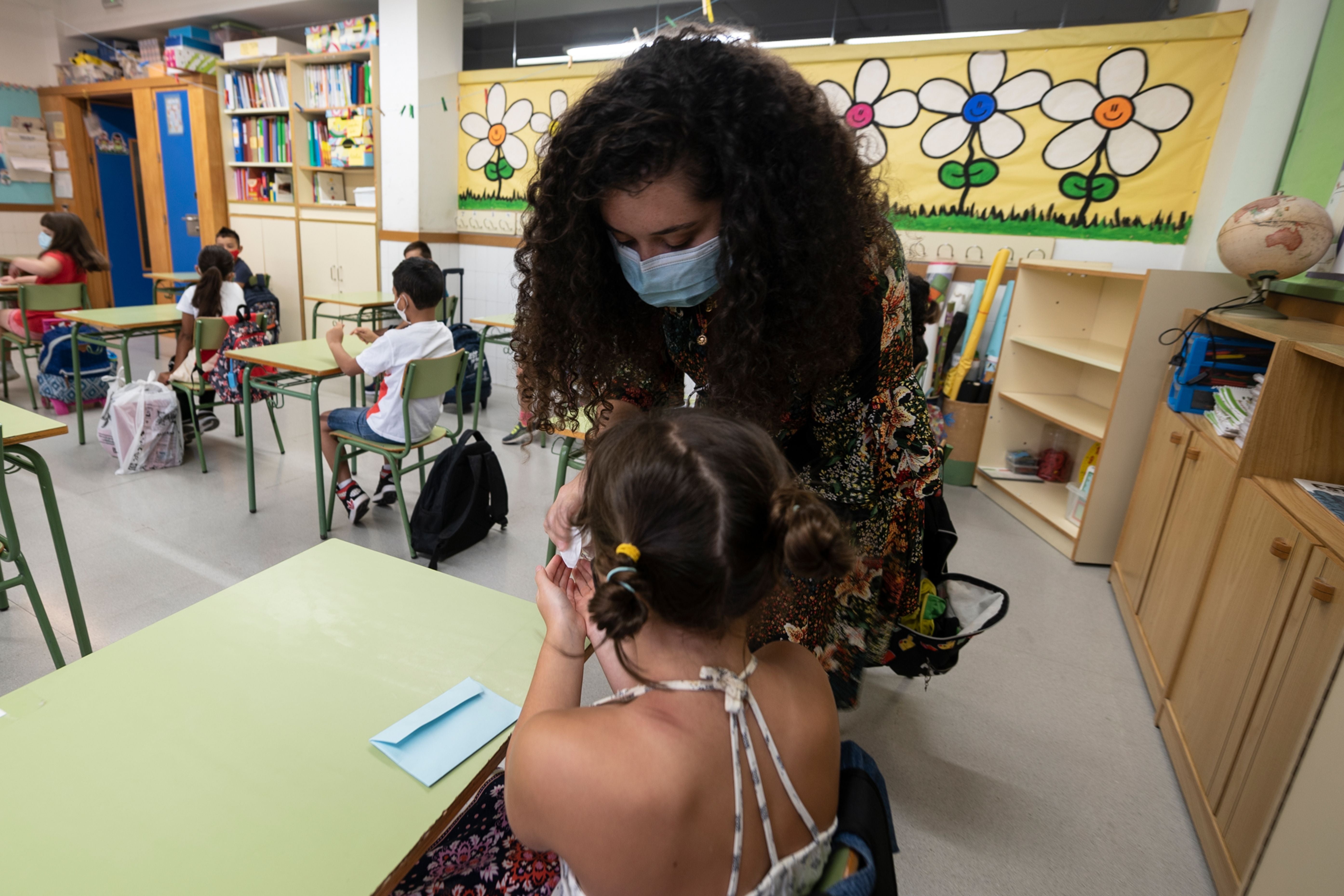A life lesson: Foreign teaching assistants in Spain suffer over wages
Hundreds of British language assistants in Valencia say what was a dream job has turned into a nightmare with salaries being paid months late or not at all in some cases, reports Conor Faulkner

“I suffered from acute insomnia,” Jesse says, “waiting for payments and wondering if I’d be able to pay rent that month, buy groceries, or pay for transportation.”
The 28-year-old, from Seattle, is one of hundreds of part-time English teachers that have been left without pay for months at a time in the Valencia region of southern Spain.
More than 1,200 auxilliares de conversacion – known as language assistants or “auxes” – work across the region, but most have had to deal with their salaries arriving months late. Some are still yet to see a penny for their work this school year.
About 50 desperate language assistants protested outside government buildings in Valencia in December, frustrated that their calls and emails were ignored or passed between departments, but nothing changed. The payment problems have even forced some teachers, often young students in their first stint living abroad, to leave the country.
“I have heard of a few people moving back home,” says Sophie, 43, a language assistant from Scotland. Londoner Alex, teaching in central Seville, has heard similar: “I know of one American for sure who has left the programme.”
“I am really disgusted about the way the Valencian government has treated all of us,” Sophie adds. “They blamed the auxiliaries for not having paperwork in on time but that was rubbish – they are just incapable of doing their job correctly.”
“People left the programme because they were running on fumes financially,” Jesse believes. “Others maxed out their credit cards just to stay afloat.”
Sophie described how her “daughter in the UK was having to pay my rent and bills for me, which as a mother is embarrassing”.
Language assistants are promised a monthly stipend of €1,000 (£836) in return for assisting English lessons for 16 hours a week. The roles are often filled by modern languages students as part of their year abroad, and attract teachers from the UK, US, Australia, New Zealand, and India.
Yet for many in the Valencia region, what was supposed to be a dream job has turned into a nightmare: “Over and over again they [the Valencian government] fail to communicate with us and only give us excuses,” explains Kayden, 28, from the “Auxiliares de Conversacion sin Cobrar” campaign group that organised last month’s protest.
When contacted for an explanation, the Valencian government blamed technical and administrative faults: “An incorrect bank account number paralysed all payment orders and the process had to be restarted,” a spokesperson said. “We have improved the system so that when it detects an incorrect bank account it does not block the rest of the transfers.”
This evasiveness is consistent with the myriad of excuses language assistants have heard, but contradicts what many were themselves told: “We were ultimately told that they won’t be able to change the broken payment system citing strict fiscal legislation,” Jesse says. Yet, Kayden and the campaign group were told that “December payment was late due to four bad bank accounts”, delaying other payments.

In the UK, the language assistants scheme has long been run by the British Council. All British language assistants in Valencia were placed there by the council, but they could do little to help. “I emailed the British Council several times only to be told that we had been warned and that there is nothing they can do about it,” Sophie says, “even after I asked why they still had Valencia in the programme knowing full well that this is an annual problem.”
Speaking to The Independent, a spokesperson from the British Council confirmed that “there have occasionally been delays in receipt of payments in Valencia and, when this has happened, we have liaised as appropriate with the relevant authorities to ensure a speedy solution.
“As far as we are aware all monthly payments this academic year have been made with minimal delay to the payment schedule, and no language assistants in Valencia or elsewhere in Spain who originally applied through the British Council are waiting on outstanding payments.”
Widely viewed as an instrument of cultural soft power, the British Council has been hampered by government funding cuts in recent years. The Foreign Office has demanded cuts of £185m over five years, and, when combined with a loss of income during the Covid-19 pandemic, the body has been forced to close 20 of its offices globally and is looking to make 20 per cent of its staff redundant. A British Council spokesperson confirmed, however, that the language assistants team had not been affected.
The long-running Erasmus exchange scheme, another British Council responsibility that arranged placements for third-year university students, has been replaced by the Turing Scheme following Brexit, and after overseeing a relatively successful transition year, the council then lost the contract to government outsourcer Capita.
The novelties of studying and working in Europe in the immediate post-Brexit world caused administrative hiccups before the school year even started. Many British language assistants struggled to get appointments for, or obtain, the correct type of visa they now need to live and work in Spain and were left waiting for paperwork in England as the academic year started.

“My friends had issues getting appointments and would make contact every day,” Grace, 20, from Nottingham, says, “whether that be by email or phone, and would get no answer”.
As Britain emerges into the post-Brexit world and attempts to reposition itself in the geopolitical pecking order, cuts to its most effective soft power instrument may seem at odds with the “Global Britain” brand but it keeps with the government’s commitment to cutting internationally-minded projects.
Last year, Rishi Sunak announced that Britain’s foreign aid budget would be cut by 0.2 per cent – a figure that could equate to around £4bn annually.
Cutting foreign aid and sidelining respected cultural institutions with long-held experience could not only damage Britain’s global reputation but also blunt its effectiveness as a self-proclaimed superpower and hinder its capacity to help British citizens abroad.
For part-time English teachers in Valencia, however, it doesn’t seem that the British Council could have done much, even if they wanted to. Responsibility clearly lies, Alex feels, with the Spanish: “The conselleria are not equipped to handle the administration and payment of such a high number of auxiliaires.”
Unsure how they will pay rent and bills, the Valencia region’s consistent payment problems have caused Jesse, and hundreds of other language assistants, to, as he puts it, stop “eating out, travelling, and generally enjoying living in Spain ... part of the reason we and others took the job”.
Join our commenting forum
Join thought-provoking conversations, follow other Independent readers and see their replies
Comments


Bookmark popover
Removed from bookmarks